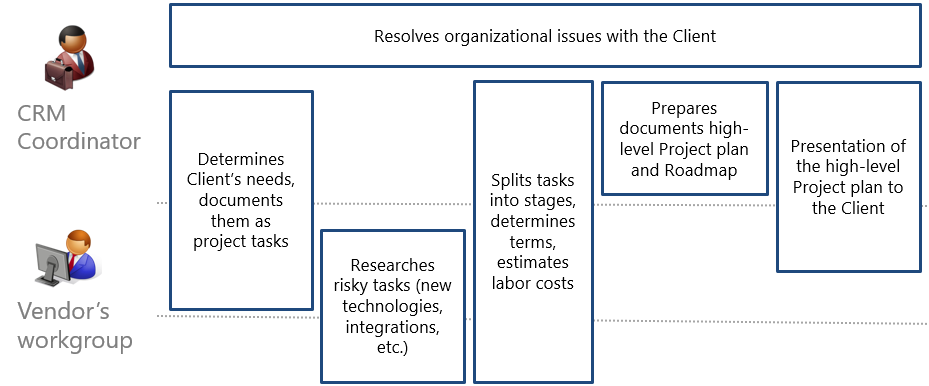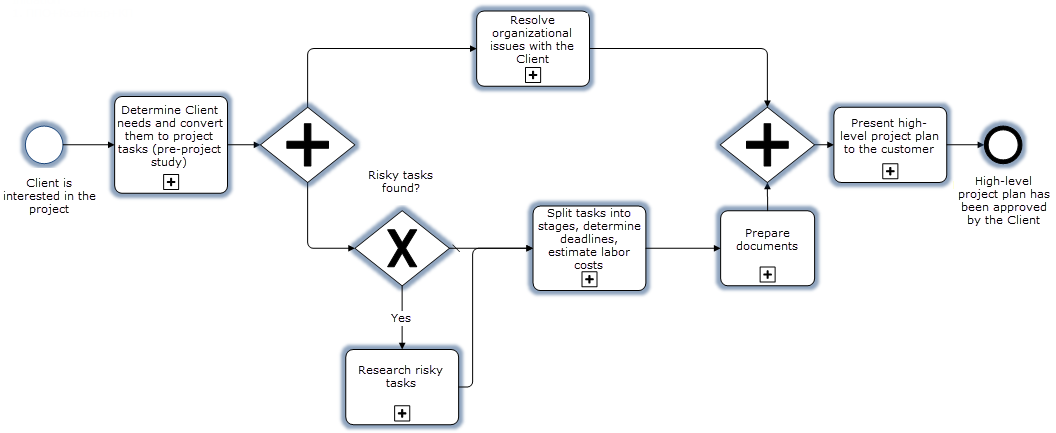Every internal implementation project starts with identifying the Client’s business need and planning the general project tasks. The Initiation phase also includes resolving of all organizational questions, risk management, planning of project stages and tasks (Fig. 11).
Fig. 11 Project team structure and responsibilities on the Initiation stage (independent implementation)

Organizational planning and issue resolution are done in parallel, up until the high-level project plan is approved (Fig. 8).
Fig. 12 General process diagram for the Initiation phase of an independent implementation

Determining the Client’s business needs, their decomposition and generating the list of tasks (pre-project survey)
On the first step of the Initiation phase process, determine the needs of the Client and create a list of tasks. This process consists of the following general stages:
1.The CRM Coordinator passes all required information about the goal of the pre-project survey, budget, terms, tasks, etc.
2.If the pre-project survey is required, the project manager performs the following steps:
•Studies the information received from the CRM Coordinator.
•Studies the product functions and solutions implemented in other companies. At this stage, the Project Manager studies existing know-hows and solutions, consults with the industry experts, implementation consultants, business consultants who have experience of working with this product.
•Prepares a list of questions for the Client interview. The purpose of the interview is to clarify the tasks to be solved as a result of implementation, and the reasons for initiating the project and goals that must be achieved.
•Prepares the list of questions on the project’s IT component. At this step, we recommend clarifying which systems will be engaged or implemented, the number of users, etc.
3.The Project Manager conducts the pre-project survey.
4.The Project Manager compiles the list of tasks and identifies those with the highest risks.
Resolving organizational issues
At this stage, the CRM Coordinator resolves organizational issues:
•Agrees with the Project Manager the terms of preparing project documents, identifies the terms of the high-level project plan and roadmaps presentation to the Client.
•Organizes meetings, agrees on the participants.
Risk research
If the preparation process reveals risk tasks, risk research must be carried out. Participation from the product experts may be required. You can always request reference meetings or information on the Vendor’s implementation experience from the Account Manager. The research results should be formalized and attached to other project documents. The risk research results will be useful later, for estimating the project budget and terms.
At this stage, conduct a training on the product for the Vendor’s team. This may take the form of training courses or a self-study using the information from the Creatio Academy.
Splitting tasks into stages, determining terms, estimating labor costs
At this stage, the Project Manager creates the project roadmap and splits the global tasks into sub-projects. Additionally, he:
1.Evaluates labor costs.
2.Sets the sub-project terms and stages of the first sub-project.
3.Estimates additional costs (business trips, purchases, etc.).
Preparing documents
The Project Manager prepares all required documents, including a high-level Project plan and Roadmap. The documents may be agreed upon with the CRM Coordinator, if needed.
High-level plan presentation to the Client
After preparing and approving all project documents, the CRM Coordinator arranges a meeting with the Client. The goal of the meeting is the high-level plan presentation to the Client. The Project Manager must be present, other participants are optional.
After all approvals have been received and implementation budget has been allocated, the project is deemed as officially launched.
See also
See also






